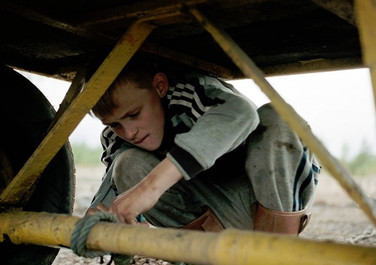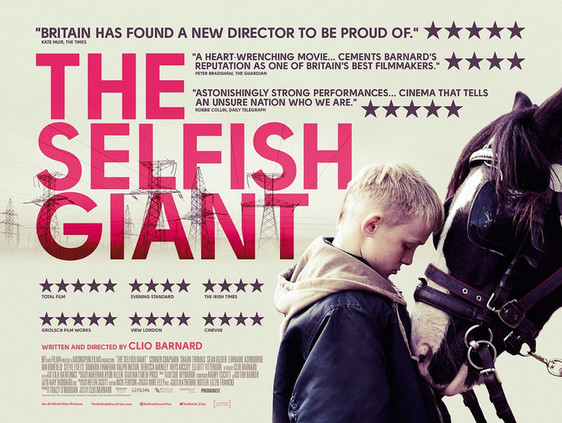
CAST & CREW
Starring: Conner Chapman
Shaun Thomas
Sean Gilder
Directed by Clio Barnard
British Film with English Subtitles
Running Time: 116 Minutes
This Film is Not Rated
Starring: Conner Chapman
Shaun Thomas
Sean Gilder
Directed by Clio Barnard
British Film with English Subtitles
Running Time: 116 Minutes
This Film is Not Rated
Reviewed by Anthony Lane – The New Yorker
Just how loosely “The Selfish Giant” is based on Oscar Wilde’s story of the same name becomes clear within the first ten seconds. Arbor (Conner Chapman), a lad of thirteen, lies under his bed and pounds his fists against the base of it. Swear words arc and spit from him like sparks, although they are barely words; such is Arbor’s rage that it issues, more often than not, in a blur of noise and motion. Waiting outside a house, next to a lamppost, he shins up it, just for something to do. He takes pills for his hyperactivity, but his older brother, a drug addict, keeps stealing them. Their mother cannot control her sons, and there is no man around. Arbor is expelled from school for bad behavior, leaving a blank where his future is meant to be. He is, in short, on the scrap heap.
That, however, is where he comes to life. The collecting of scrap metal may not be big business, but it’s business, and that’s enough for Arbor and his best friend, Swifty (Shaun Thomas), whose own family setup makes Arbor’s home look like the Little House on the Prairie. The boys gather any metals they can lay hands on, pots and pans included, and sell them to Kitten (Sean Gilder), a local scrap merchant. Names are a scabrous pleasure here; Swifty’s feckless father is called Price Drop (Steve Evets), and Kitten is a big and mangy brute, who, ravening for profit, likes to keep his paws clean while others do the dirty work for him. Nothing is dirtier or more dangerous than collecting electric cable, which has to be stripped of its plastic sheathing to reveal the precious bright wire, as it is known, that lies beneath. Kitten has a toothed machine for the stripping; at one point, to instill fear, he feeds Arbor’s hand toward the teeth.
The director is Clio Barnard, and the setting is Bradford, in the North of England, close to where “The Arbor,” her previous work, took place. That was a more self-conscious exercise, braiding documentary with fiction. The new film follows a simpler and more fabular track, asking us not to question but to trust its authenticity. Such trust is soon given, not least because you believe at once in the comradeship of the kids—Arbor the skinny grifter, who orders the police to take their shoes off when they come to quiz him about cable theft, and the softer bulk of Swifty, who has a gentle way with the horses that graze on public scrubland behind their streets. We even get a sulky race, sulkies being the two-wheeled carts that are hitched to the horses and pulled at speed—at dawn, and completely against the law—along the highway, with teams of backers driving behind and blocking traffic. You couldn’t make it up, and you don’t have to.
And what of Wilde? How much of his fairy tale remains, and who, or what, might the selfish giant be? Well, Kitten is one candidate; Gilder, perfectly cast in the role, gives the best kind of supporting performance, not hogging the stage but winning our attention on the sly. One brief scene, late in the film, when he finally admits—in a low voice that we haven’t heard before—to doing something wrong, is a thing of wonder, as his pride bottoms out into humility. But there are other giants: the fat gray chimneys of the power stations that lower over the land, against skies the color of nothing, and the pylons that stand sentry into the distance. The electric charge they carry is lethal, but to Arbor’s greedy gaze it seems magnetic. From the beginning, you can feel this restive, pulsing movie burn from discontent toward disaster. The whole thing should sap the spirit, and make you despair of a lost and wasted country, yet you are constantly shocked awake by the energy of Arbor, whether it is spent on insolence, initiative, or grief. The boy’s a bright wire.
Just how loosely “The Selfish Giant” is based on Oscar Wilde’s story of the same name becomes clear within the first ten seconds. Arbor (Conner Chapman), a lad of thirteen, lies under his bed and pounds his fists against the base of it. Swear words arc and spit from him like sparks, although they are barely words; such is Arbor’s rage that it issues, more often than not, in a blur of noise and motion. Waiting outside a house, next to a lamppost, he shins up it, just for something to do. He takes pills for his hyperactivity, but his older brother, a drug addict, keeps stealing them. Their mother cannot control her sons, and there is no man around. Arbor is expelled from school for bad behavior, leaving a blank where his future is meant to be. He is, in short, on the scrap heap.
That, however, is where he comes to life. The collecting of scrap metal may not be big business, but it’s business, and that’s enough for Arbor and his best friend, Swifty (Shaun Thomas), whose own family setup makes Arbor’s home look like the Little House on the Prairie. The boys gather any metals they can lay hands on, pots and pans included, and sell them to Kitten (Sean Gilder), a local scrap merchant. Names are a scabrous pleasure here; Swifty’s feckless father is called Price Drop (Steve Evets), and Kitten is a big and mangy brute, who, ravening for profit, likes to keep his paws clean while others do the dirty work for him. Nothing is dirtier or more dangerous than collecting electric cable, which has to be stripped of its plastic sheathing to reveal the precious bright wire, as it is known, that lies beneath. Kitten has a toothed machine for the stripping; at one point, to instill fear, he feeds Arbor’s hand toward the teeth.
The director is Clio Barnard, and the setting is Bradford, in the North of England, close to where “The Arbor,” her previous work, took place. That was a more self-conscious exercise, braiding documentary with fiction. The new film follows a simpler and more fabular track, asking us not to question but to trust its authenticity. Such trust is soon given, not least because you believe at once in the comradeship of the kids—Arbor the skinny grifter, who orders the police to take their shoes off when they come to quiz him about cable theft, and the softer bulk of Swifty, who has a gentle way with the horses that graze on public scrubland behind their streets. We even get a sulky race, sulkies being the two-wheeled carts that are hitched to the horses and pulled at speed—at dawn, and completely against the law—along the highway, with teams of backers driving behind and blocking traffic. You couldn’t make it up, and you don’t have to.
And what of Wilde? How much of his fairy tale remains, and who, or what, might the selfish giant be? Well, Kitten is one candidate; Gilder, perfectly cast in the role, gives the best kind of supporting performance, not hogging the stage but winning our attention on the sly. One brief scene, late in the film, when he finally admits—in a low voice that we haven’t heard before—to doing something wrong, is a thing of wonder, as his pride bottoms out into humility. But there are other giants: the fat gray chimneys of the power stations that lower over the land, against skies the color of nothing, and the pylons that stand sentry into the distance. The electric charge they carry is lethal, but to Arbor’s greedy gaze it seems magnetic. From the beginning, you can feel this restive, pulsing movie burn from discontent toward disaster. The whole thing should sap the spirit, and make you despair of a lost and wasted country, yet you are constantly shocked awake by the energy of Arbor, whether it is spent on insolence, initiative, or grief. The boy’s a bright wire.






